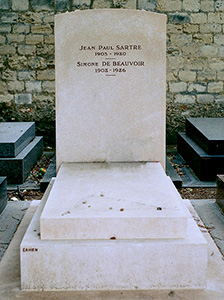My dear, dear little one. I was impatiently waiting for your letter. Ten days without a thing - I was beginning to worry. Send just brief notes if necessary but do write, my sweet little one. I become distraught as soon as I feel you're not there.
 These words, redolent of understated longing, were penned by Simone de Beauvoir in the summer of 1950, and addressed to Jean-Paul Sartre, underscoring a love affair that spanned more than fifty years, and a relationship that de Beauvoir described as the greatest achievement of her life.
These words, redolent of understated longing, were penned by Simone de Beauvoir in the summer of 1950, and addressed to Jean-Paul Sartre, underscoring a love affair that spanned more than fifty years, and a relationship that de Beauvoir described as the greatest achievement of her life.
Their relationship, one of the most culturally significant of the 20th century, was never conventional. Right from the start, Sartre insisted on sexual openness and multiple partners, scandalous even by the standards of les années folles. De Beauvoir would be his core, his centre, but there would be other, peripherals. On the surface, their arrangement was a model of freedom, equity and honesty. De Beauvoir, for example, in a letter to Sartre dated 27 July 1938, related that "something extremely agreeable has happened to me... I slept with Little Bost three days ago."
He was tremendously astonished when I told him I'd always had a soft spot for him - and he ended up telling me yesterday evening that he'd loved me for ages. I'm very fond of him. We spend idyllic days, and nights of passion. But have no fear of finding me sullen or disoriented or ill at ease on Saturday; it's something precious to me, something intense, but also light and easy and properly in its place in my life...
However, beneath the surface, there was a darker aspect. De Beauvoir, the celebrated author of The Second Sex, a foundational text of 20th century feminism, was in thrall to the older philosopher. Sartre's philandering caused her pain, and her autobiography and letters reveal her jealousy and dependence. She admitted, for example, to being annoyed by Sartre's affair with Olga Kosakiewicz, one of her own students, and insisted that she had "no intention of yielding to her the sovereign position that I had always occupied, in the very centre of the universe."
Nevertheless, it would be a mistake to suppose that these all too human feelings meant their relationship was at its core conventional. According to Quentin Hoare, it was above all "the blazing, disconcerting truthfulness" that marked the radicalism of their love for each other. The following passage, relating events that transpired during the course of a philosophy tutorial, gives a sense of their customary frankness.
I started to explain the “ontological proof” – she wasn’t listening but cried and hit me; I kissed her and again Descartes and tears. I was really fed up; I thought that she was putting me on and that the mixture of philosophy and feelings was absolutely intolerable. She was sobbing, but it was faked, and I didn’t fall for it; on the other hand, I was touched when she fell into my arms, admitting that she had done it on purpose and why, trying to be sincere; I kissed her and caressed her to calm her.
The speaker here is de Beauvoir, and the student, 17-year-old lycée pupil Nathalie Sorokine, the daughter of Russian emigré parents. In 1943, a formal accusation was leveled against de Beauvoir in relation to her affair with Sorokine, and although criminal charges failed to materialise, de Beauvoir lost her licence to teach in France, never to get it back again.







